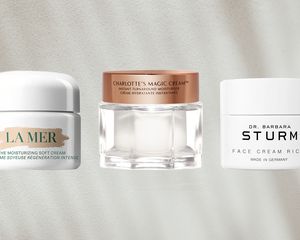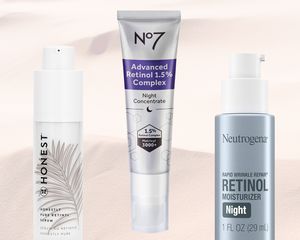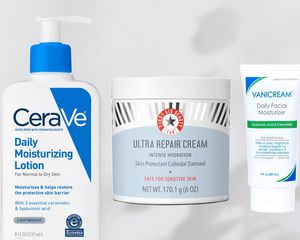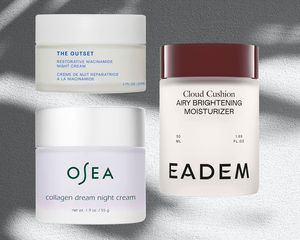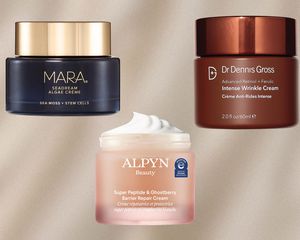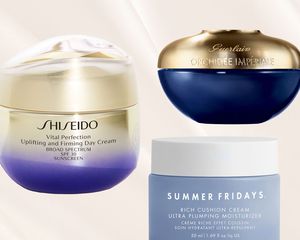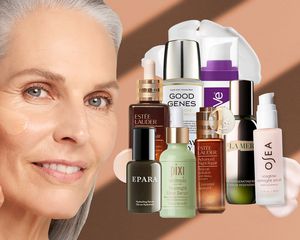:max_bytes(150000):strip_icc()/USED_phytosphingosine-for-skin--18-ebd4b9a98c154bba8335df5985ba21e7.jpg)
Tawni Bannister for BYRDIE
If we’ve said it once, we’ve said it a thousand times: A healthy skin barrier is essential for healthy, youthful skin. The outermost layer of our skin, it’s responsible for not only keeping moisture from getting out, but also irritants and toxins from getting in. When it comes to the skin barrier, ceramides often get lauded as the most important component and the ingredient everyone knows about, talks about, and looks for. But it turns out that they’re not the only player in the game. Phytosphingosine is another lipid that plays a crucial role in the skin barrier, both helping to minimize the likelihood of skin irritation and keeping skin hydrated. Think of the skin barrier as a brick wall—the cells are the bricks, and the phytosphingosine (and ceramides) make up the mortar in between. Lose that mortar and the brick wall is going to have trouble staying intact.
Ahead, New York City-based dermatologist Marnie Nussbaum and Denver-based plastic surgeon and skin expert Manish Shah explain why you should be using this unsung hero in your skincare routine.
Meet the Expert
- Marnie Nussbaum is a New York City-based dermatologist.
- Manish Shah is a Denver-based plastic surgeon and skin expert.
Phytosphingosine
Type of ingredient: Moisturizer
Main benefits: Skin barrier support, anti-inflammatory, anti-bacterial
Who should use it: Almost anyone can benefit
How often should you use it: Daily
Works well with: Ceramides, peptides
Don’t use with: N/A
What Is Phytosphingosine?
Phytosphingosine is a phospholipid, a fat that’s naturally found in the outermost layer of the skin. “It’s one component of the skin barrier, along with ceramides, cholesterol, and fatty acids,” explains Nussbaum. The skin barrier is crucial for ensuring your skin looks and feels good—think of it as the ultimate line of defense against all the dirt, pollution, grime, and other toxins that your skin is constantly bombarded with. When the barrier is compromised or weakened, all of those unwanted factors can get in, resulting in all kinds of issues from redness to rashes.
Benefits of Phytosphingosine For Skin
When it comes to your skin, fat is good. Particularly phytosphingosine, which is imperative for healthy skin.
- Strengthens the skin barrier to keep irritants out: "Just like you need a strong ozone layer to protect the planet, you need a strong barrier to protect your skin. Without it, all kinds of toxins and irritants can reach the deeper layers of the dermis, resulting in dryness, irritation, and redness,” says Shah. As previously mentioned, phytosphingosine is one of the key players in maintaining the health and function of this oh-so important barrier.
- Triggers the production of natural moisturizing factor: “As we age, we lose natural moisturizing factor and therefore our skin becomes dry, flaky, and appears to have more fine lines and wrinkles. When phytosphingosine is added to topical moisturizers or other products, it improves the skin's ability to stay hydrated, firm and intact,” says Nussbaum.
- Can deliver anti-inflammatory and antibacterial effects: Studies show that phytosphingosine may have these benefits. Couple that with its skin barrier-strengthening properties, and it’s a great option for those dealing with acne or irritated skin conditions such as eczema.
Side Effects of Phytosphingosine
Generally speaking, this ingredient is fairly inert and well-tolerated, so most people shouldn't be concerned about any type of side effects. With that being said, it's always better to err on the side of caution and test phytosphingosine on a small area of the skin via a patch test. This can rule out fear of allergy, but as with introducing any new ingredient to your skin, your safest bet is to talk to your dermatologist.
How to Use It
You can find phytosphingosine in many iterations, including in primers, serums, moisturizers, facial oils, and eye creams. Just remember that you'll want to cover your face evenly when using phytosphingosine, which isn't always conducive to your skin and makeup goals when you're using it in products that target specific areas, like eye creams. That's why many users prefer to use phytosphingosine in moisturizer form.
Our Derms' Favorite Products With Phytosphingosine
"This affordable primer uses a mineral blend and phytosphingosine to keep your skin looking smooth and hydrated," says Shah. He adds that it also contains vitamins and chamomile extract for anti-inflammatory purposes, hence the anti-redness and skin-soothing effects, choice for anyone prone to breakouts.
Shah recommends this anti-ager for anyone who's looking to not only reduce the signs of wrinkles, but prevent them as well (insert hand raising emoji here). "It replenishes water and nutrients to improve the dermis to improve the firmness of the skin," he says. With .2 percent phytosphingosine, it's a great choice for keeping your complexion looking smooth, plump, and youthful.
"Formulated with a moisturizing and skin-nourishing mix of vitamins, ceramides, phytosphingosine, and antioxidants, this is one of my favorite hydrating masks," says Nussbaum. You can either leave it on for just 10 minutes, or, do as she suggests and leave it on as an overnight sleeping mask for days when your skin is feeling especially stressed out or dehydrated (like when you're on an airplane).
"This product does a great job of including heavy-hitting ingredients, including a combination of peptides, retinol, phytosphingosine, and ceramides to help brighten skin and diminish the signs of aging," says Shah. Phytosphingosine and ceramides may also help counteract any potential irritation from the retinol. Bonus: The single-dose capsules are ideal for travel (no need to stress about spills).
One of Shah's picks, this AM staple promises to pack oil-free moisture while also providing sun protection. Along with phytosphingosine, dill seed extract is meant to help improve the appearance of elasticity, and the refreshing scent—floral with a touch of citrus—is an added plus.
"This restorative eye cream delivers a brightening effect to the under eye area with a combinations of vitamin C and peptides," says Nussbaum. Replenishing ceramides and phytosphingosine promise to lock in moisture, and, unlike many other eye creams, Nussbaum also adds that this layers well under makeup.
We have yet to find a dermatologist who doesn't love CeraVe's line of affordable and effective skincare, and Nussbaum is no exception. Of this product, she says it's a "Great, broad-spectrum, non-comedogenic sunscreen that both protects the skin from harmful UV rays and helps maintain the skin's natural moisture barrier." Credit an effective combination of hyaluronic acid, ceramides, and, you guessed it, phytosphingosine.
